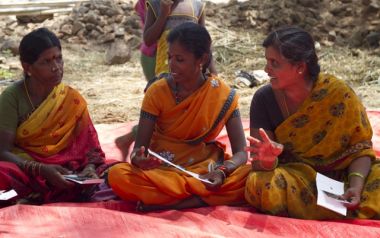Cross-posted from ifpri.org written by Ruth Meinzen-Dick, IFPRI
 I grew up in Tamil Nadu, south India. It was a dry area, but a good well supplied our house and a few other houses around us. Then one year a farmer nearby installed a deeper well with an electric pump, and our well ran dry. That started a “race to the bottom”: As more and more farmers got pumpsets, the water table continued to fall and everyone had to deepen their wells to keep up.
I grew up in Tamil Nadu, south India. It was a dry area, but a good well supplied our house and a few other houses around us. Then one year a farmer nearby installed a deeper well with an electric pump, and our well ran dry. That started a “race to the bottom”: As more and more farmers got pumpsets, the water table continued to fall and everyone had to deepen their wells to keep up.
Today, India faces this problem writ large. Over 60 percent of the irrigation and 85 percent of domestic water in India now comes from water below the ground. As water tables fall, wells need to be dug deeper and more pumping power is required to deliver water to users. Ultimately, groundwater becomes unavailable.
World Water Week 2017 (Aug. 27-Sept. 1) focuses on conserving and reducing waste in water use. These efforts are especially relevant for groundwater supplies, which are often overtaxed and difficult to manage responsibly.
Because well owners who take water from the same aquifer may be geographically dispersed, it is hard for them to know how much others are taking, let alone regulate their own withdrawals. And because underground water dynamics are complicated, people often don’t understand how their water use affects others.
Experimental games can help reveal what motivates people to cooperate in the use of any jointly used resource—including groundwater, as well as forests, fisheries, and surface irrigation. Until recently, no one had assessed whether these games could help stimulate cooperation as well. To investigate this issue, IFPRI partnered with the Foundation for Ecological Security (FES), an NGO in India, and Arizona State University, with support from the CGIAR program on Water, Land and Ecosystems. FES, which helps communities in Andhra Pradesh better manage their water resources, added a “groundwater game” designed by ASU experts to its program in some of the communities affected by groundwater depletion.



